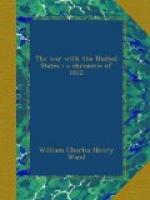By half-past seven the American army had all come into action, and Drummond was having hard work to hold his own. Brown, like Winfield Scott, at once saw the supreme importance of taking Battle Rise; so he sent two complete battalions against it, one of regulars leading, the other, of militia, in support. At the first salvo from Drummond’s seven guns the American militia broke and ran away. But Colonel Miller worked some of the American regulars very cleverly along the far side of a creeper-covered fence, while the rest engaged the battery from a distance. In the heat of action the British artillerymen never saw their real danger till, on a given signal, Miller’s advanced party all sprang up and fired a point-blank volley which killed or wounded every man beside the guns. Then Miller charged and took the battery. But he only held it for a moment. The British centre charged up their own side of Battle Rise and drove the intruders back, after a terrific struggle with the bayonet. But again success was only for the moment. The Americans rallied and pressed the British back. The British then rallied and returned. And so the desperate fight swayed back and forth across the coveted position; till finally both sides retired exhausted, and the guns stood dumb between them.
It was now pitch-dark, and the lull that followed seemed almost like the end of the fight. But, after a considerable pause, the Americans—all regulars this time—came on once more. This put the British in the greatest danger. Drummond had lost nearly a third of his men. The effective American regulars were little less than double his present twelve hundred effectives of all kinds and were the fresher army of the two. Miller had taken one of the guns from Battle Rise. The other six could not be served against close-quarter musketry; and the nearest Americans were actually resting between the cross-roads and the deserted Rise. Defeat looked certain for the British. But, just as the attackers and defenders began to stir again, Colonel Hercules Scott’s twelve hundred weary reinforcements came plodding along the Queenston road, wheeled round the corner into Lundy’s Lane, and stumbled in among these nearest Americans, who, being the more expectant of the two, drove them back in confusion. The officers, however, rallied the men at once. Drummond told off eight hundred of them, including three hundred militia, to the reserve; prolonged his line to the right with the rest; and thus re-established the defence.
Hardly had the new arrivals taken breath before the final assault began. Again the Americans took the silent battery. Again the British drove them back. Again the opposing lines swayed to and fro across the deadly crest of Battle Rise, with nothing else to guide them through the hot, black night but their own flaming musketry. The Americans could not have been more gallant and persistent in attack: the British could not have been more steadfast in defence.




